Teach Me How to Pray – An In-Depth Look at the Lord’s Prayer
Please note that this article may contain affiliate links. As an Amazon Associate, I earn on qualifying purchases at no additional cost to you. You can read more at the bottom of this page or read my full disclosure on my Affiliate Disclosure Page
What if you could ask Yeshua (Jesus), “Lord, teach me how to pray!” and have Him give you a perfect model for prayer? Well, in Luke 11:1, one of the disciples (talmidim) of Yeshua asked Him that very thing. Yeshua then went on to give His talmidim that model for prayer that has come to be known as “The Lord’s Prayer”.
There is so much to unpack here in this, Yeshua’s prayer to the Father, and we are going to examine it further to learn about the power of praying the Lord’s prayer and how WE should pray to our Abba, our Father!
So let’s say to Yeshua, “Teach us how to pray!” and explore the Lord’s prayer!
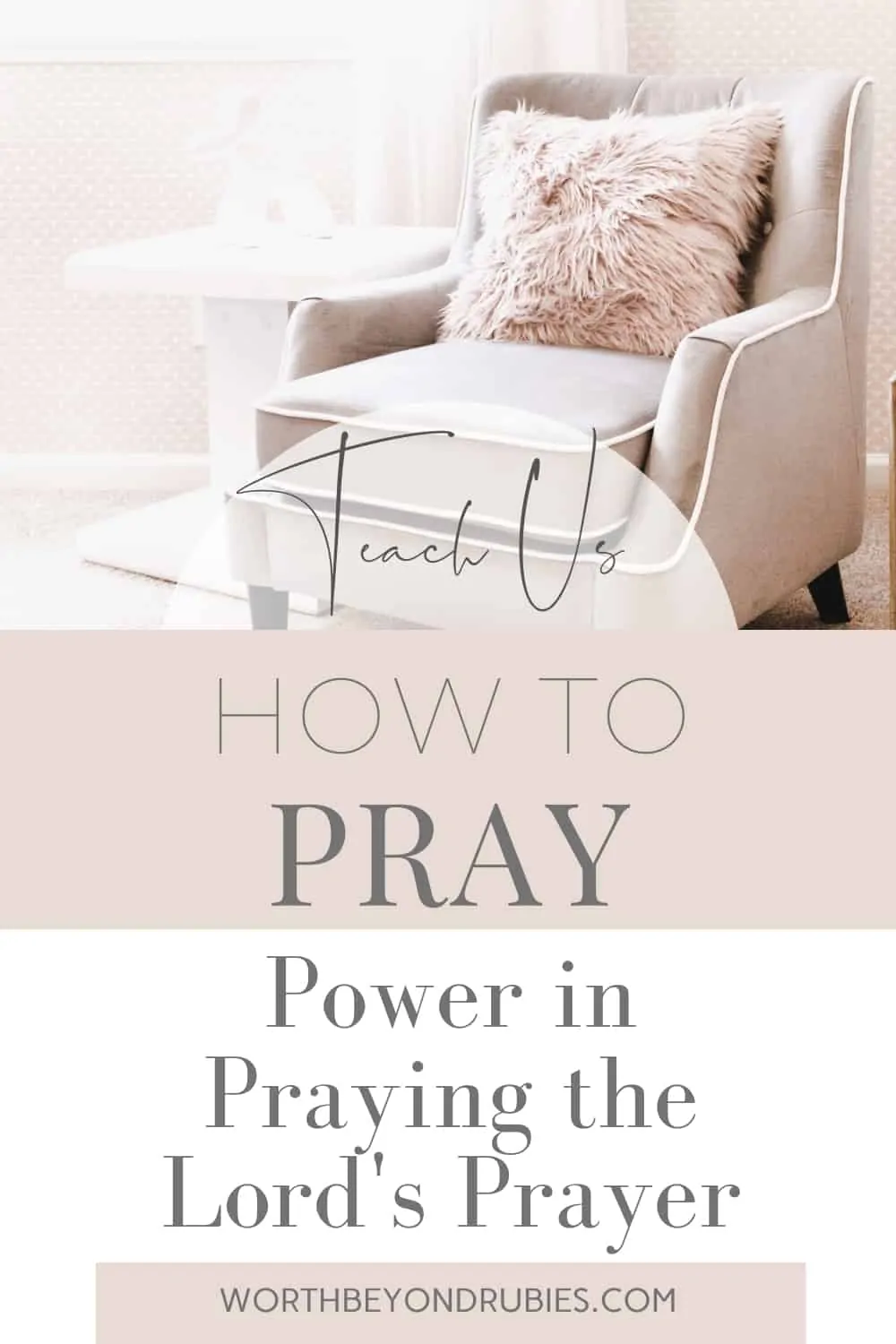
Teach Me How to Pray – The Avinu
The Lord’s Prayer is also known as the Avinu. Avinu is the Hebrew for “our Father”, which is also the first word in the Hebrew of the prayer.
אבינו שבשמים יתקדש שמך
Our Father in Heaven, let your Name be sanctified…
Most of us know these words. For many of us, it was the first prayer we learned.
It goes on to say:
Let Your Kingdom come and your will be done, as in Heaven so on earth. Give us today our daily bread, and pardon our debts as we forgive those indebted to us. Do not let trials overcome us but deliver us from what is evil. For Yours is the Kingdom, the power and the glory forever and ever. Amen.
There are many variations of the prayer but they all essentially say the same thing and follow the same pattern.
So let’s look at this pattern our Messiah taught us in this prayer.
What are the Elements of the Lord’s Prayer?
The Lord’s prayer consists of:
- Praising the Father
- Submitting to the Lord’s Divine Will
- Provision
- Forgiveness
- Protection
- Providence
Teach Me How to Pray the Elements of the Lord’s Prayer
Praising the Father
“Our Father in Heaven, let your Name be sanctified.”
We begin this prayer by praising the Name of the Lord and recognizing Him as Lord of all. We are acknowledging the holiness and awesomeness of His Name and His character. To be sanctified is to be revealed as holy. In this sense, Yeshua is saying to the Father ‘let your Name be shown to all to be holy and set apart from all others.’
Praising God and giving Him all honor due Him should be first and foremost in our prayers.
Prayer should be a form of worship and not just a list of petitions. We come before Hashem as though we are entering the Holy Place and offering up our prayers like incense before Him.
We are entering sacred space and we should always begin by acknowledging Him and His goodness and His authority.
Submitting to the Lord’s Divine Will
“Let Your Kingdom come and your will be done, as in Heaven so on earth.”
In this part of the prayer, Yeshua is asking that the coming Kingdom of the Lord be revealed, which we will see in the age to come!
He often spoke of the coming Kingdom and told many parables about it.
In addition to the coming Kingdom, He speaks of the will of the Father.
Here we are giving over our own desires, our own wants, and submitting to Hashem’s (The Name) will.
We can oftentimes pray for things that seem good to us in our limited view, but sometimes good can be the enemy of best.
We have to trust Him that He has a plan and purpose and be willing to surrender our will to His. This is an act of trust and faith that allows us to let go and let God be God!
Faith in Hebrew is ’emunah’ and it presents a challenge for all of us at times because life is ever-changing and these changes present challenges that are meant to help our faith to grow!
Faith and belief are not the same. You can believe that the Lord exists and yet lack faith!
I was on a call recently with my Rabbi and some members of our congregation and we discussed this very thing.
A lack of faith, we said, is sometimes not so much about whether we trust Hashem as much as it is about whether or not we trust we heard Him correctly…or at all! How do we know it is not our own will speaking?
The Bible tells us that Abram believed in the Lord (not believe in as existence but believe in the truth of His Word and His character) and Hashem counted it to him as righteousness.
Abram’s faith was so great that the Lord chose him to cut covenant with and to make him the father of all who believe.
Genesis 5:13-21:
Then He said to Abram, “Know for certain that your seed will be strangers in a land that is not theirs, and they will be enslaved and oppressed 400 years. But I am going to judge the nation that they will serve.
Afterward they will go out with many possessions. But you, you will come to your fathers in peace. You will be buried at a good old age. Then in the fourth generation they will return here—for the iniquity of the Amorites is not yet complete.”
When the sun set and it became dark, behold, there was a smoking oven and a fiery torch that passed between these pieces.
On that day Adonai cut a covenant with Abram, saying, “I give this land to your seed, from the river of Egypt to the great river, the Euphrates River: the Kenite, the Kenizzites, the Kadmonites, the Hittites, the Perizzites, the Raphaites, the Amorites, the Canaanites, the Girgashites, and the Jebusites.”
tlv
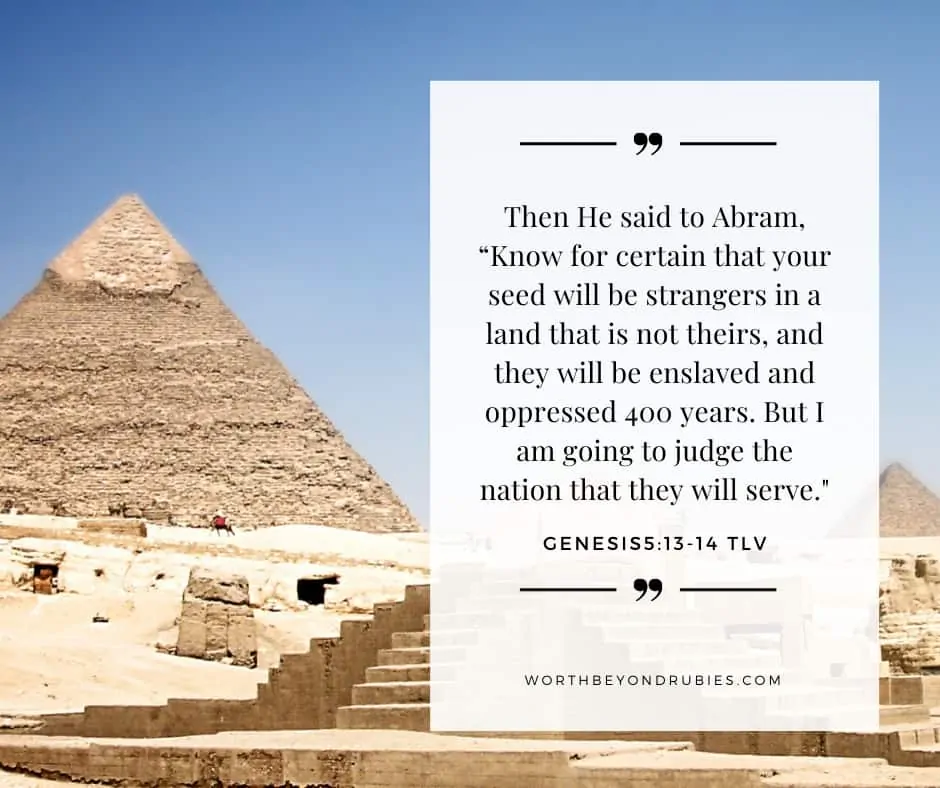
Provision
“Give us today our daily bread…”
Trusting in the Lord to provide all our needs is a further extension of faith.
We ask Him to give us what we need, not necessarily what we want and not necessarily more than we need at the current time.
So why is this important? Because He showed Himself faithful to the Israelites in the wilderness by giving them just enough manna to sustain them at that time; no more and no less. By doing this, they had to rely on Him for each meal.
It was not based on who gathered more because anything remaining would rot. It was not based on who was stronger or who worked harder. It was not based on any of their own doing! It was Him who sustained them each day.
When we ask Him to provide our daily bread, we are asking Him to meet our needs in a way that gives Him the glory and honor and not ourselves.
We say this but how hard is it for us to really live this? I know personally how hard it is to exercise this level of faith that requires that you do not take matters into your own hands. Now I don’t mean sit back and let the Lord take care of you and you do nothing. That is not wisdom.
What I am speaking of is knowing that no matter our circumstances, He will make a way. We have to be partners with Him. For example, He may provide a job for us but we have to get up and go to work!
When we ask Him to provide our daily bread, we are asking Him to meet our needs in a way that gives Him the glory and honor and not ourselves. Click To TweetForgiveness
“…and pardon our debts as we forgive those indebted to us.”
We ask for His forgiveness and we acknowledge His expectation that we also extend grace and forgiveness to others who have wronged us.
Now this is not the feeling of forgiveness. We may not feel forgiveness at that moment, especially when someone has wronged us and not apologized or asked forgiveness. But we make a decision to forgive and the feelings will line up later.
Making the decision to forgive others doesn’t mean you have to all of a sudden feel better or that you have to even be in relationship with that person.
But we forgive in large part because it frees us. There is power in forgiveness because you are choosing to let go of pain and hurt and anger and not allow it to further take root in your heart and mind.
Yeshua said in Mark 11:25:
“Whenever you stand praying, if you have anything against anyone, forgive him, so that your Father in heaven may also forgive you your transgressions.”
tlv
Standing prayer is the Amidah. It is known as The Prayer and it is one Yeshua Himself prayed. It is a daily prayer that Jewish people pray multiple times during the course of the day to this very day. It is always said standing and this is the prayer Yeshua referred to here.
He is saying that even when you are fulfilling a mitzvah (a command), if you have unforgiveness in your heart, go and make it right before coming before the Lord in prayer so that He will also forgive you (part of the Amidah is repentance and asking forgiveness for your sins).
Protection
“Do not let trials overcome us but deliver us from what is evil.”
Here we ask for the Lord to protect us from being overtaken by the trials and temptations in life. We also ask that He help us to resist the enemy and what is evil.
We have a very real enemy who wants to destroy our lives. In this prayer, we ask for the Lord’s strength to overcome and for Him to help us to defeat the enemy’s temptations and the effects of evil in the world.
We live in very trying and tumultuous times and I feel this petition is needed now as much as ever as the enemy tries to make us feel despair and cause us to view others as our enemies!
Ephesians 6:12 says:
“For we are not struggling against human beings, but against the rulers, authorities and cosmic powers governing this darkness, against the spiritual forces of evil in the heavenly realm.”
cjb
Providence
“For Yours is the Kingdom, the power and the glory forever and ever. Amen.”
And finally we have the acknowledgment of the Lord’s providence and dominion over all.
I think it is fitting that this comes right after the request to keep us from evil because we are stating our position as a citizen of not only Heaven but a subject of the King of Kings and Lord of Lords!
We place ourselves under His Kingship and as our King, He rules over us and not the prince of this world.
We are also acknowledging His coming Kingdom that has no end!
Teach Me How to Pray – Did They Not Know How??
Yeshua grew up as a Jewish boy and into our Rabbi and our Messiah! He attended synagogue and went to the Temple!
He prayed the prayers the Jewish people still pray and He based the Avinu on those prayers. There are aspects of Jewish prayer all throughout the Lord’s Prayer.
Every day, the Jewish people, myself included, join ourselves to those praying all over the world. For Messianic Jews, we also include the Avinu as part of those prayers. In fact, it has been part of these prayers since at least the late 1st century (Didache 8:3)
So if Jewish prayer has existed since before Yeshua’s time, why then were the disciples asking Him “teach us how to pray”? Didn’t they already know the blessings and prayers in Jewish daily life?
We will look again at Luke 11:1:
“One time Yeshua was in a certain place praying. As he finished, one of the talmidim said to him, “Sir, teach us to pray, just as Yochanan taught his talmidim.”
cjb
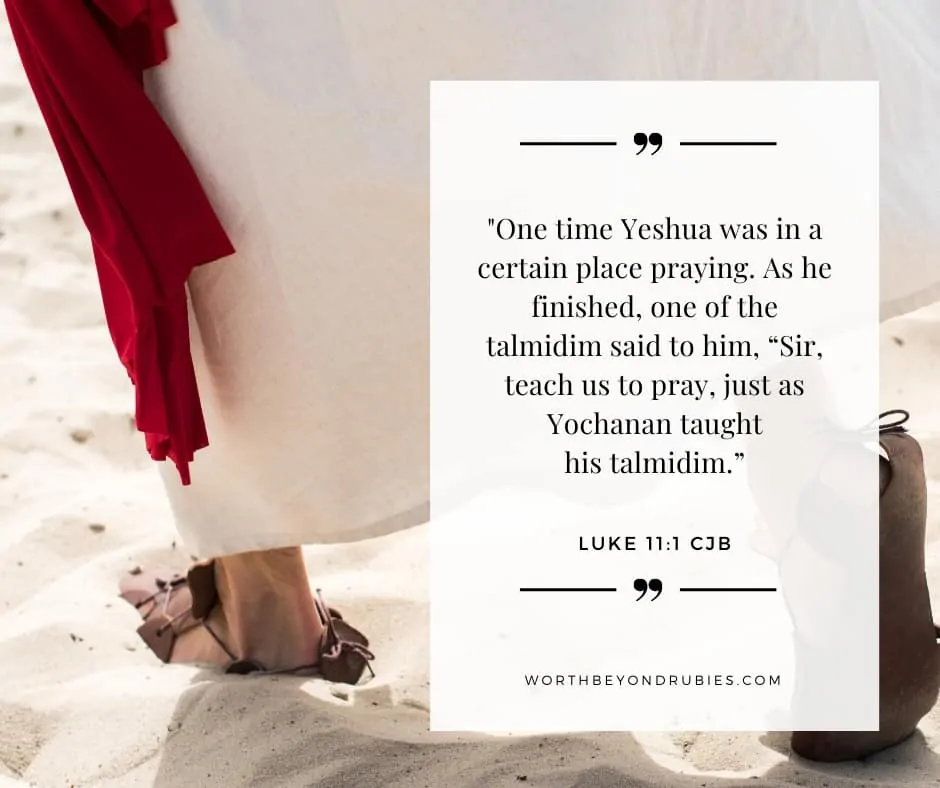
Yochanan is Yochanan the Immerser or John the Baptist. John had disciples as well and it was not uncommon for Rabbis to teach their disciples (yes, Rabbis had disciples also called students or followers) short prayers to use as additional prayers or meditations when they prayed the daily prayers. In fact, it is encouraged for people to add their own petitions to the Amidah and make it heartfelt and personal.
As we get to the petition for forgiveness in the Amidah, we often confess specific sins. When we get to the petition for healing, we make requests on behalf of those who need specific healing. Even though Jewish prayer is quite liturgical, it is not supposed to be just reciting words. It is to be with intention and with a heart focused on Hashem.
So here, the Disciples were asking Yeshua to give them an additional meditation to add to their prayers as was often done. “Teach me to pray Lord!”
In fact, there are instances of this with various Rabbis in the Talmud. So this was not a new thing they were asking.
And as I stated earlier, Messianic Jews even today add the Avinu to their daily prayers, not in place of it.
Teach Me How to Pray – In Summary
So we see the importance of prayer in the lives of Yeshua and His Disciples and it continues even today!
We also see the structure of prayer as it was structured in Jewish life and how Yeshua would have followed the model of prayer in His own life.
Maimonides said:
“The obligation of prayer is that every person should daily, according to his ability. offer up supplication and prayer, first uttering praises of God, then with humble supplications and petition asking for all that he needs, and finally offering praise and thanksgiving to the Eternal for the benefits already bestowed on him in rich measure.”
(Laws of Prayer 1:2)
I hope that you can use the Avinu or Lord’s Prayer to help you build a foundation for prayer or strengthen your daily prayer life. How amazing is it that we too can say “Lord teach me how to pray” and go to His Word to receive His instruction?
What are some ways the Lord’s Prayer has impacted your life and your faith? Have you learned something new about it in this post that will help you in your prayer life? Share in the comments!
And get your FREE Prayers and Scriptures for Effective Spiritual Warfare below as my gift to you!
CJB – Taken from the Complete Jewish Bible by David H. Stern. Copyright © 1998. All rights reserved. Used by permission of Messianic Jewish Publishers, 6120 Day Long Lane, Clarksville, MD 21029. www.messianicjewish.net.
Tree of Life (TLV) – Scripture taken from the Holy Scriptures, Tree of Life Version*. Copyright © 2014,2016 by the Tree of Life Bible Society. Used by permission of the Tree of Life Bible Society.
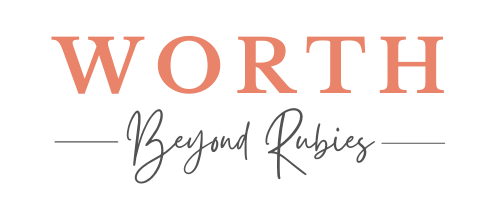
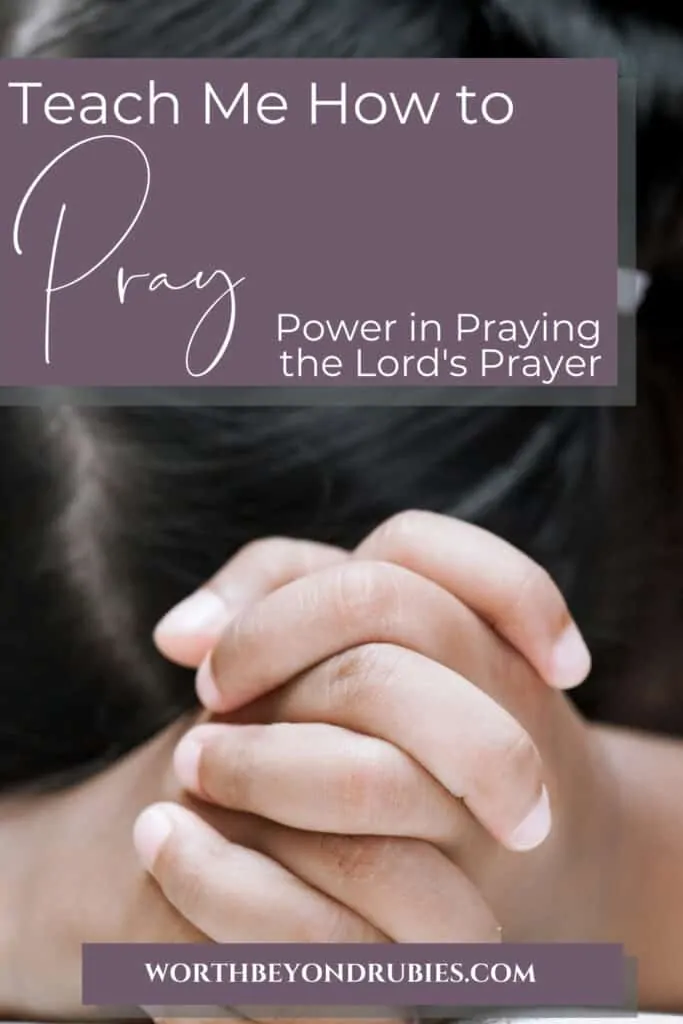
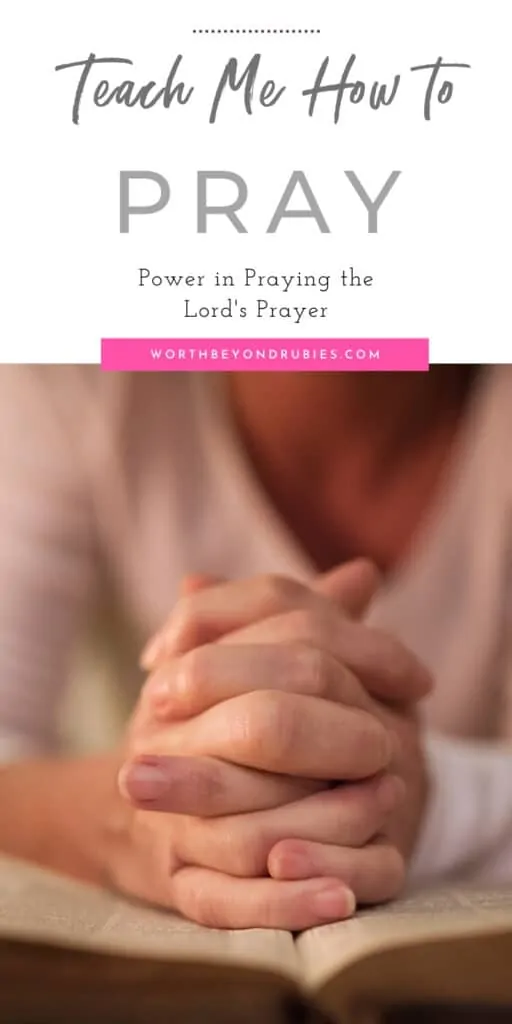

Thank you for helping me organize my praying method. I learned a lot.
I am so glad you found it helpful!!